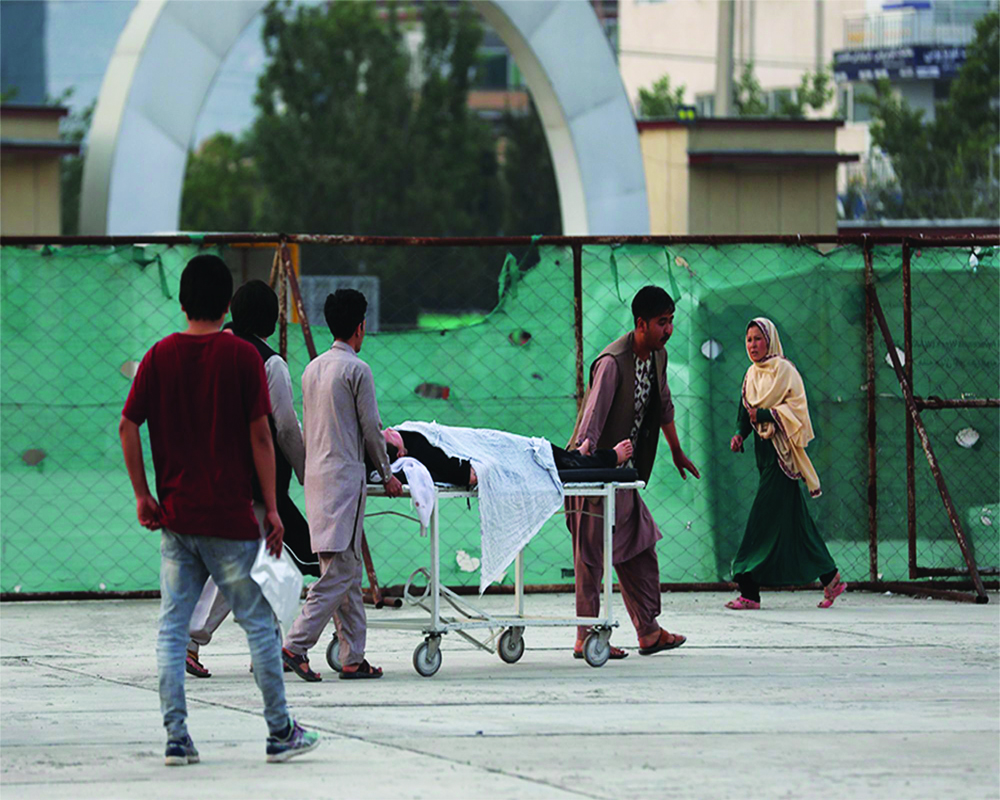Pakistan has bequeathed its cancerous approach onto the terror groups in Afghanistan, and the future of minorities there is dark and foreboding
MA Jinnah’s first nominated Cabinet was more accommodative as compared to the Pakistani politics of today — he nominated JN Mandal, a Hindu, as the first Law Minister; Zafarullah Khan, an Ahmadiyya, as the Minister for Foreign Affairs and many Shias (like Jinnah himself) — a plurality that is unthinkable now. The Pakistani Military shared the spirit of the times with the rise of General Musa Khan, a Shia Hazara, as the Commander-in-Chief of the Pakistan Army (1958-1966). Another mercurial officer was Air Marshal SA Changezi, who famously refused to meet Afghan King Zahir Shah during a visit to Pakistan, owing to the perceived mistreatment of fellow Hazaras in Afghanistan. Now, Pakistan’s slide towards religious intolerance has constitutionally declared Ahmadiyyas as “non-Muslims”, whereas Shias and offshoots (20-25 per cent of Pakistan’s population) are routinely attacked and persecuted. However, given the even more conservative moorings across the Durand Line in Afghanistan, the discrimination of minorities is more intense — the imminent return of the Taliban in Kabul signals not just the return of puritanical absolutism and revisionism, but also the targeted brutality onto its Shia/Hazara populace (approximately 15 per cent of the population).
The recent car bombing in front of the Sayed-al-Shuhda school in the Hazara-dominated neighbourhood of Kabul horrifically killed 85, mostly schoolgirls between 11 and 15 years, in an augury of the times ahead. Despite the timeline of this attack coinciding with the holy month of Ramadan, this area had earlier seen similar bloodshed with attacks on maternity hospitals, schools and tutoring centres. While the Afghan Taliban did deny any role in this specific attack and attributed it to another group, Islamic State–Khorasan Province, the beleaguered fate of minorities like the Hazaras looks ominous. Like the Taliban, which is a project of the Pakistani “establishment”, the Islamic State-Khorasan Province was also formed by a Pakistani Taliban commander, Hafiz Saeed Khan — most members were formerly with the Pakistani Taliban (Tehrik-i-Pakistan), mostly from the Orokzai Pashtun stock. Irrespective of the groups, the Hazaras and other Shias like Ismailis have faced the brunt of relentless persecution throughout history, but for the relative reprieve in the Hamid Karzai-Ashraf Ghani dispensations.
Across the unaccepted borders with Pakistan, the Shias and Hazaras in particular, face the brunt of terror groups like Lashkar-e-Jhangvi, who remain committed to exterminate the Shias. These virulent sectarian groups have close ideological ties with the Taliban (on both sides) and have conducted spectacular and deadly attacks against the Shias — even the suicide bomber who killed former Pakistani Prime Minister Benazir Bhutto (who too was a Shia) belonged to Lashkar-e-Jhangvi. Quetta in Baluchistan is home to biggest settlement of the oppressed Hazaras in Pakistan, as also the unfortunate killing ground for most sectarian terror attacks — relaying the inevitable dangers of the State recklessly pandering to majoritarian-sectarianism to solidify itself. However, the dangers to suchlike “minorities” are multiplied when the sovereign Government itself runs the risk of passing on to the likes of the Taliban, which seems likely with the leaving of the US/NATO troops from Afghanistan.
While sectarianism is one cut of endangered “minority” status in Afghanistan, ethnicity is the other. Therefore, the Tajik and Uzbek, who may be essentially of Sunni denomination, are not spared the wrath of the Taliban or the Islamic State-Khorasan Province. Such persistent animus and diminishment led the Hazaras to form their own militias like the now-fragmented, Abdul Ali Mazari’s Hezb-e-Wahdat, or the comparatively new Hazara warlord, Abdul Ghani Alipoor, who is now popularly seen as an effective vanguard against the fury of the Taliban. But these ethnic warlords are recklessly volatile, fickle and known to shift allegiances with the proverbial “exchange of suitcases”, exposing their community to severe persecution. The endless cycle of sectarian wars in Afghanistan was exemplified by the reprisal attacks by the Taliban in Mazar-i-Sharif township in 1998 — thousands of Hazaras were searched out and killed in a systemic house-to-house killing frenzy as the Taliban was believed to shoot “anything that moved”. As always, Pakistani hand in the Talibani advance was omnipresent as many Pakistani soldiers had accompanied the Taliban march. The Hazaras were apparently made to pay a price for the killing of several thousand Taliban soldiers a year earlier, after a failed attempt by the Taliban to takeover Mazar-i-Sharif in 1996.
Now the dangerous snake pit created and abetted by the Pakistani “establishment” has managed to wear out the US/NATO troops, the sectarian and ethnic minorities in Afghanistan are left vulnerable. Pakistan has bequeathed its cancerous and manipulative approach onto the warlords and other terror groups operating in Afghanistan, and like its blood-soiled streets of Quetta — the augury of future Afghanistan for “minorities” (like in Pakistan) is dark and foreboding.
(The writer, a military veteran, is a former Lt Governor of Andaman & Nicobar Islands and Puducherry. The views expressed are personal.)


























